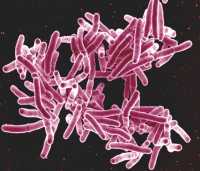
29 Oct Gene Signature Blood Test Can Diagnose TB and Treatment Response
MedicalResearch.com Interview with:
 Purvesh Khatri, Ph.D.
Purvesh Khatri, Ph.D.
Associate Professor
Stanford Institute for Immunity, Transplantation and Infection (ITI)
Stanford Center for Biomedical Informatics Research (BMIR)
Department of Medicine
Stanford University
Stanford, CA 94305
MedicalResearch.com: What is the background for this study? What are the main findings?
Response: We have previously described a 3-gene signature for distinguishing patients with active tuberculosis (ATB) from those with other diseases, latent mycobacterium tuberculosis (LTB) infection, and healthy controls (Sweeney et al. Lancet Respir Med 2016).
The current study in JAMA Network Open is a follow up study to validate the 3-gene signature in 3 additional independent cohorts that were prospectively collected.
Using these 3 cohorts we have now showed that the 3-gene signature
(1) can identify patients with LTB that will progress to ATB about 6 months prior to diagnosis of active tuberculosis.
(2) can identify patients with ATB in active screening, and
(3) can identify patients with ATB at diagnosis that have higher likelihood of persistent lung inflammation due to subclinical ATB at the end of treatment.
MedicalResearch.com: What should readers take away from your report?
Response: Including the 3 cohorts in this current study, the 3-gene signature is shown to distinguish patients with ATB from those with LTB, other diseases and healthy controls across 18 independent cohorts of almost 3000 samples from 13 countries, independent of age, HIV co-infection, and BCG vaccination.
To the best of my knowledge, this is the first prospectively validated blood-based gene signature for diagnosis of active tuberculosis.
Further, to the best of my knowledge, this is also the first diagnostic test that satisfies the World Health Organization (WHO) target product profiles (TPP) for a triage test to rule out ATB and to predict progression from LTB to active tuberculosis.
MedicalResearch.com: What recommendations do you have for future research as a result of this work?
Response: The 3-gene signature is a strong candidate for further investigation in a larger cohort and further implementation.
This study would not have been possible without our collaborators Jason Andrews (Assistant Professor of Medicine (Infectious Diseases), Stanford University) and Julio Croda (Federal University of Mato Grosso do Sul, Brazil), who performed the active screen study in Brazil. In this study, they performed “active screening” of a population to identify patients with ATB. This is a difficult study to do as patients have no or low severity symptoms compared to a “passive screen” study where a patient presents himself or herself to a clinic with high symptom severity. We were also fortunate to have collaborators from the Catalysis Health Foundation, who shared with us data from their treatment response study to allow us to test whether the 3-gene signature can identify patients who fails treatment earlier than current practice.
Stanford University has filed patent application for the 3-gene signature, which has been licensed non-exclusively for commercialization.
Citation:
Warsinske HC, Rao AM, Moreira FMF, et al. Assessment of Validity of a Blood-Based 3-Gene Signature Score for Progression and Diagnosis of Tuberculosis, Disease Severity, and Treatment Response. JAMA Netw Open.2018;1(6):e183779. doi:10.1001/jamanetworkopen.2018.3779
[wysija_form id=”3″]
[last-modified]
The information on MedicalResearch.com is provided for educational purposes only, and is in no way intended to diagnose, cure, or treat any medical or other condition. Always seek the advice of your physician or other qualified health and ask your doctor any questions you may have regarding a medical condition. In addition to all other limitations and disclaimers in this agreement, service provider and its third party providers disclaim any liability or loss in connection with the content provided on this website.
Last Updated on October 29, 2018 by Marie Benz MD FAAD
